Muller’s ‘Nightpiece’ lets Ghostbird audience know up front they’re in for evening of ‘productive labor’
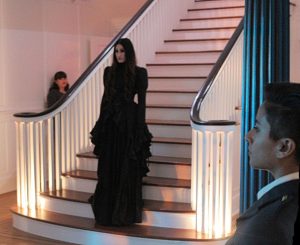 Ghostbird Theatre Company is performing October House in the historic Langford Kingston Home now through November 9. It’s an aggregation of four live plays and another on video that explores our own disembodiment and pervasive disconnection from our community and the environment in which we live. It’s also a study in democratic theater, that is, theater that requires the audience to engage in “productive labor” and do the work of interpretation.
Ghostbird Theatre Company is performing October House in the historic Langford Kingston Home now through November 9. It’s an aggregation of four live plays and another on video that explores our own disembodiment and pervasive disconnection from our community and the environment in which we live. It’s also a study in democratic theater, that is, theater that requires the audience to engage in “productive labor” and do the work of interpretation.
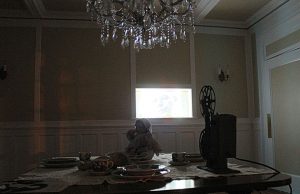 This is no more evident than in the prerecorded video loop of Heiner Muller’s Nightpiece. It’s running in the Langford-Kingston dining room where attendees are sequestered before the immersive tour through the two-story Craftsman home begins.
This is no more evident than in the prerecorded video loop of Heiner Muller’s Nightpiece. It’s running in the Langford-Kingston dining room where attendees are sequestered before the immersive tour through the two-story Craftsman home begins.
In the case of Nightpiece, not only is the material strange  and dis-associative, but Barry Cavin enlisted an FGCU math professor with a German accent to read the script “since Muller is German and the accent lends authenticity to the piece.” So it’s necessary to fight through the accent to reach the dense material the reader conveys in a near monotone voice.
and dis-associative, but Barry Cavin enlisted an FGCU math professor with a German accent to read the script “since Muller is German and the accent lends authenticity to the piece.” So it’s necessary to fight through the accent to reach the dense material the reader conveys in a near monotone voice.
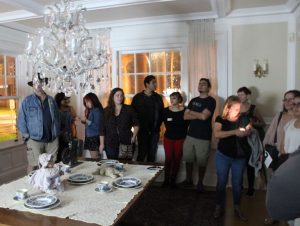 The story that emerges describes the actions of a man who might be a dummy or marionette. He sees a bicycle, but as he approaches it, an unseen threshold rises from the stage, causing him to fall. The threshold retracts back into the stage, causing the man to assume it was his own legs that betrayed him. And so he tears off his legs and uses his hands and arms to carry him in his quest to reach the bike. The story continues in that vein until
The story that emerges describes the actions of a man who might be a dummy or marionette. He sees a bicycle, but as he approaches it, an unseen threshold rises from the stage, causing him to fall. The threshold retracts back into the stage, causing the man to assume it was his own legs that betrayed him. And so he tears off his legs and uses his hands and arms to carry him in his quest to reach the bike. The story continues in that vein until 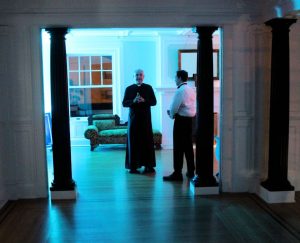 the man lies limbless on the stage, with the bike leaning against the now-seen threshold, of no further use to him.
the man lies limbless on the stage, with the bike leaning against the now-seen threshold, of no further use to him.
In 2019, Nightpiece is amenable to a plethora of interpretations. Go political, and it’s a metaphor for the way in which governments discard segments of their citizenry (be they soldiers, minorities, the poor or members of the opposing political party) in the drive to attain power or ill-conceived and 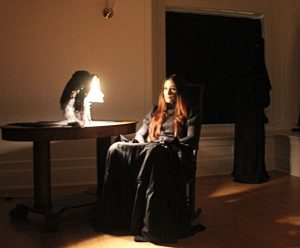 unquestioned goals. Go psychological, and the play could mean that unseen influences can operate to destroy us if we blame ourselves and each other for perceived failings or shortcomings. Go philosophical, and Nightpiece underscores the proposition that unexpected and unanticipated circumstance can derail our plans, particularly if we fail to properly analyze and evaluate them.
unquestioned goals. Go psychological, and the play could mean that unseen influences can operate to destroy us if we blame ourselves and each other for perceived failings or shortcomings. Go philosophical, and Nightpiece underscores the proposition that unexpected and unanticipated circumstance can derail our plans, particularly if we fail to properly analyze and evaluate them.
And 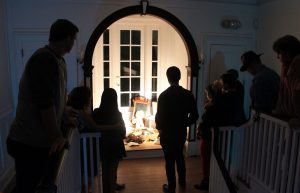 that’s the very point of the piece. It not only heralds that we must be prepared to wade through each play that Cavin has included in October House in order to mine the meanings that make the most sense to us. Nightpiece cautions that we must be active participants in the evening’s performances rather than mere spectators hoping for light and superficial entertainment.
that’s the very point of the piece. It not only heralds that we must be prepared to wade through each play that Cavin has included in October House in order to mine the meanings that make the most sense to us. Nightpiece cautions that we must be active participants in the evening’s performances rather than mere spectators hoping for light and superficial entertainment.
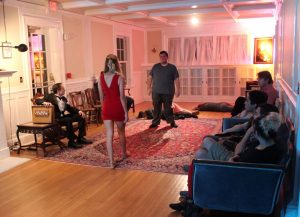 Or, as Cavin carefully notes in the Director’s Note he includes in the October House playbill, “Theater should indeed teach us about our human condition, even when it points to something dark, confusing and disturbed.”
Or, as Cavin carefully notes in the Director’s Note he includes in the October House playbill, “Theater should indeed teach us about our human condition, even when it points to something dark, confusing and disturbed.”
What better season than this to contend with these brooding conditions and in what better place than an old and empty house at the edge of a continent?
RELATED POSTS.
- With ‘October House,’ Ghostbird working to perfect immersive experience for its audiences
- Samuel Beckett’s ‘Not I’ may be best work Stella Zuri has ever done













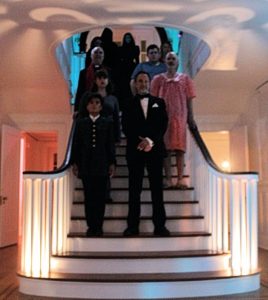

 Tom Hall is both an amateur artist and aspiring novelist who writes art quest thrillers. He is in the final stages of completing his debut novel titled "Art Detective," a story that fictionalizes the discovery of the fabled billion-dollar Impressionist collection of Parisian art dealer Josse Bernheim-Jeune, thought by many to have perished during World War II when the collection's hiding place, Castle de Rastignac in southern France, was destroyed by the Wehrmacht in reprisal for attacks made by members of the Resistance operating in the area. A former tax attorney, Tom holds a bachelor's degree as well as both a juris doctorate and masters of laws in taxation from the University of Florida. Tom lives in Estero, Florida with his fiancee, Connie, and their four cats.
Tom Hall is both an amateur artist and aspiring novelist who writes art quest thrillers. He is in the final stages of completing his debut novel titled "Art Detective," a story that fictionalizes the discovery of the fabled billion-dollar Impressionist collection of Parisian art dealer Josse Bernheim-Jeune, thought by many to have perished during World War II when the collection's hiding place, Castle de Rastignac in southern France, was destroyed by the Wehrmacht in reprisal for attacks made by members of the Resistance operating in the area. A former tax attorney, Tom holds a bachelor's degree as well as both a juris doctorate and masters of laws in taxation from the University of Florida. Tom lives in Estero, Florida with his fiancee, Connie, and their four cats.